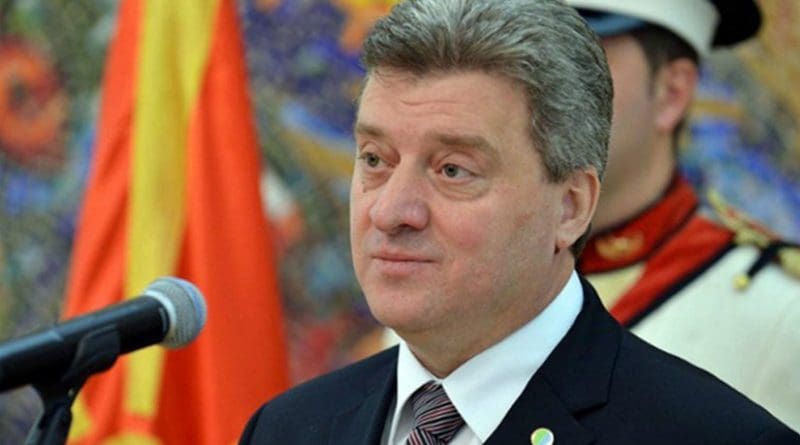Macedonia: President Ivanov Says ‘War’ Being Waged Against Country
By Sinisa Jakov Marusic
In an address to the nation on Wednesday, after the parliament majority rejected the opposition motion for his impeachment, President Gjorge Ivanov defended his decision in May to pardon top politicians, saying it was either that or an internal conflict that would have prompted him to bring the army on the streets.
“The first option was to act reactively. That envisaged me standing on the side and waiting until conditions escalated. Then I would have had to activate the army to calm the situation. But that would have left the southern border [with Greece] unprotected and open for illegal migration. It would have been a signal for millions of potential migrants that the Balkan route is re-opened. Macedonia would have been flooded with migrants,” Ivanov said.
He said that the second option, which he chose, was to pardon 56 top politicians and their associates, mostly from the main ruling VMRO DPMNE party, which he said “was preventive. This envisaged me imposing new rules over the imposed game in Macedonia; to take control over the game and provide an advantage for Macedonia.”
In his address, Ivanov insisted that Macedonia was a target of a “special war” being waged by enemies which he did not name “as part of strategies for causing tensions and establishing permanent political crises,” so that his country could not handle threats and so that it became subordinated to foreign interests.
Ivanov said that he obtained information that the ongoing anti-government protests, dubbed the “Colourful Revolution”, which started in May, after he pardoned the politicians, would have started anyway as part of the “special war” against Macedonia.
He accused the opposition Social Democrats, SDSM, and the junior ruling party, the Democratic Union for Integration, DUI, of being part of the scenario to destabilize and weaken the country.
He also said that the EU-brokered Przino accord, reached last summer between the leaders of the four main political parties, had only worsened the crisis.
The accord envisaged a set of reforms and an interim government before the country could hold early elections.
However, the election date was postponed twice since the year started after the EU, the US and all main political parties but one, the main ruling VMRO DPMNE party, said the reforms needed for truly fair elections were not yet in place.
“The rule of law was breached by the leaders of SDSM [Zoran Zaev], and of DUI [Ali Ahmeti] because constitutional order was not enough for them to meet me and to make a deal. Instead they rushed to the foreign embassies. These two irresponsible politicians endangered the rule of law, sovereignty and independence,” he claimed.
Ivanov also slated the Special Prosecution, SJO, which was formed last autumn as part of the political agreement and tasked with investigating high-level crime.
He said that this institution was deliberately targeting only the ruling VMRO DPMNE party, which backed Ivanov’s presidential run.
“Instead of a Special Prosecution we got a selective prosecution that works strictly for the sake of the opposition,” Ivanov insisted.
“Of all the millions of files that they say they have, they choose only those that involve representatives of the government, of the VMRO DPMNE. The selective prosecution of SJO has created an atmosphere of nausea in society,” he said.
Ivanov further said that his country this year faced extraordinary security challenges, that the opposition knew about and yet pursued with its plan for destabilization.
He said that one of them was the infiltration of a group of 40 militants from the northern border, presumably from Kosovo, who were in the country to retaliate for the May 2015 Kumanovo shootout between the police and a group of armed gunmen which left 18 dead.
Ivanov did not discuss this matter further, not revealing how this threat was handled.
Ivanov made his address after the ruling majority in parliament rejected an opposition motion for his impeachment.
The opposition said Ivanov should be held accountable for pardoning the politicians, which they said had escalated the political crisis and practically blocked the work of the SJO.
In early June, Ivanov withdrew all 56 of the controversial pardons after facing pressure from protesters but also from EU and US who said that his decision breached the rule of law and undermined crisis-resolving efforts.

